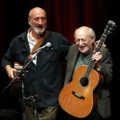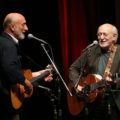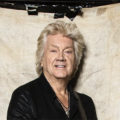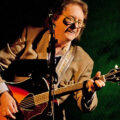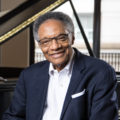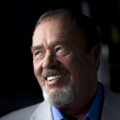Peter, Paul & Mary’s Noel Paul Stookey on marching for “Just Causes” since the days of MLK
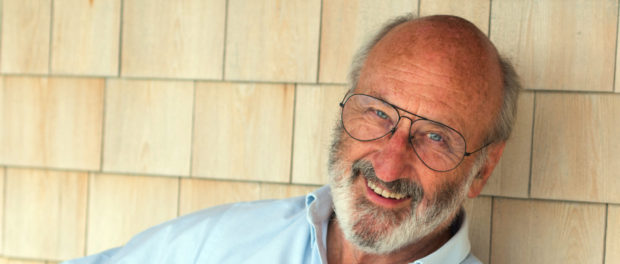 Photo provided by Sally Farr
Photo provided by Sally Farr
Ages before the social justice warriors of the internet, Noel Paul Stookey marched on the front lines of countless crusades, both individually and as a member of the iconic folk trio Peter, Paul & Mary (who’ve since been enshrined in Vocal Group Hall of Fame and earned a Lifetime Achievement Award from the Songwriters Hall of Fame).
The creator/interpreter who helped popularize “Blowin’ In The Wind,” “Leaving On A Jet Plane,” “Puff, The Magic Dragon” and mounds more recently compiled several of his most topical tunes throughout the aptly-named “Just Causes,” though rather than pocketing the profits, he’s pairing each track with a like-minded beneficiary.
With so many hot button issues currently brewing, Chicago Concert Reviews was delighted to receive a phone call from the living legend to hear all about exactly 60 years of artistry and activism, including recollections on performing right before Dr. Martin Luther King Jr. delivered the society-shifting “I Have A Dream” speech.
How did you pull together all the material that wound up becoming “Just Causes”?
Noel Paul Stookey: I think this time off has given us all a chance to look retrospectively at those things that have value in our lives. Quite honestly, I was surprised when I looked back at 50 years of writing music, particularly in the context of the trio, to see how many, sprinkled among the love songs and the dig rock & roll songs, were these songs of concern, or “Just Causes,” as the album became titled.
 I’m starting as early as the 1970s to write a song about the potential loss of electrical energy [“Juice”]. I remember there were huge blackouts across the United States. We were talking about, “what cha gonna do when the juice runs down?” Beginning there and then looking at a whole catalogue was as surprising to me, as I think it’s been to some of the reviewers, to see the span of lyric focus, politically, environmentally, as well as painfully. I would say in the case of “Jean Claude,” which deals with the recollection of a Holocaust survivor, the span of concern that can be called folk music, or folk-inspired because they tell a story, is speaking to a circumstance that’s broader than just romantic love. I think it’s timely. We move forward, but I don’t think we lose our sense of value from the past.
I’m starting as early as the 1970s to write a song about the potential loss of electrical energy [“Juice”]. I remember there were huge blackouts across the United States. We were talking about, “what cha gonna do when the juice runs down?” Beginning there and then looking at a whole catalogue was as surprising to me, as I think it’s been to some of the reviewers, to see the span of lyric focus, politically, environmentally, as well as painfully. I would say in the case of “Jean Claude,” which deals with the recollection of a Holocaust survivor, the span of concern that can be called folk music, or folk-inspired because they tell a story, is speaking to a circumstance that’s broader than just romantic love. I think it’s timely. We move forward, but I don’t think we lose our sense of value from the past.
What was the reason you decided to pass along the profits?
Stookey: It all began with me standing in the frozen food section of my local supermarket [laughs] and seeing Paul Newman’s brand of products [that benefit various charities]. I looked and I realized how I had ignored that as an inspirational message. I thought, “wow, I’m a songwriter who has lived very comfortably,” from not only my performances, but from these things called royalties, which come in when someone buys a record. Beyond a certain point, you look at the royalties and you think, “well, I’ve put my kids through school. What can I do? Aren’t these royalties like profits?” Ah-ha! And the lightbulb went off in the back of my head. I could put out an album where the title, “Just Causes,” is justified in two ways. One, the only subject material that I’ll put on the album are about causes, so the album is just causes, but each of the subjects, each of the concerns that are expressed [can be] thematically connected to a righteous cause.
Can you shine some light on a few of your beneficiaries?
Stookey: For instance, “Danny’s Downs” contributes profits to the National Down Syndrome Congress and then the Dallas Holocaust & Human Rights Museum for the “Jean Claude” song I mentioned before…Part of the funding [from “Not That Kind of Music”] went to Music To Life, which I have to say paternalistically is linked to me because my daughter, Liz, [runs] this organization. You can read about it MusicToLife.org, and see the impact young singer/songwriters can have on their communities and will have with the kind of mentorship, leadership and support that Music To Life has given them.
I think possibly the most representative tune, in terms of its attitude, is “Revolution (1×1),” [which benefits the spiritual renewal/social justice initiative Sojourners]. One of the people on the team did a beautiful [music video] combination of photos of smiling faces, encouraging faces, thumbs up faces and crazy faces [to illustrate], as the bridge says: “We’re a raggle-taggle army, got no uniform or guns. Still we been called by coincidence, so maybe we’re the ones. To take this revolution to the street, smile at every solitary person that we meet. We’re gonna wave at total strangers, no matter where they’re from. Gonna start a revolution, gonna win it one by one.” The theory being that if there’s gonna be peace on earth, let it begin with me.
 Take us to the day when you performed before Dr. King’s “I Have A Dream” speech.
Take us to the day when you performed before Dr. King’s “I Have A Dream” speech.
Stookey: A little known fact, actually, was that the event happened twice on that day [August 28, 1963]. We had a dress rehearsal where all the music and all the speeches happened. Knowing Dr. King, the gifted orator that he was, I’m sure it was not word for word, but to a large extent, everything was duplicated from the rehearsal. That resulted really in two really great outcomes. It was certainly a collection point, standing on the lawn of the Washington Monument and recognizing there were over 200,000 people there, soon to be 250,000, when we marched to the Lincoln Memorial. It [also] gave us a gravitas as we marched following the rehearsal. There was a really pronounced sense of purpose that I’m not sure would’ve been there without a rehearsal if we all just collected and walked over. That made it twice as moving.
Also, there’s the story of Mary [Travers] taking Peter [Yarrow’s] hand, looking out over the crowd and saying to him, “we are witnessing history.” That moment seldom occurs to those of us who were involved in the making of it. For her to have that presence of mind to be able to see that this was a pivotal time in the history of humankind was pretty amazing, and certainly [true], in retrospective. [I also remember actor/host] Ossie Davis’ introduction of us with such kind words that we had come to underline the reason for us all being here at the March On Washington.
What role did the songs from that event and era play in helping fuel social change?
Stookey: We certainly borrowed two heavyweight pieces of music to commemorate that event, [Bob] Dylan’s “Blowin’ In The Wind” and [Pete] Seeger & [Lee] Hays’ “If I Had A Hammer.” It was a great time in American musical history. Pop radio had come to recognize that there could be more than just romantic ballads or novelty tunes that, in fact, there was music available that addressed the concerns of the time. That linkage and the subsequent involvement in even the protests against the war in Vietnam led, ironically, to the popularity of a song like “Leaving On A Jet Plane,” which had certainly nothing to do with the war, but it had tons to do with the returning body bags or the families that were broken up by virtue of the enlisted folks going into Vietnam. The ‘60s were timely and awesome. One of the lovely spin outs out of the ‘60s was the love generation and that didn’t go away either.
If you listen to “Just Causes,” you’ll hear that thread running through much of the music that was created since the ‘60s that speaks to the fact that if we’re gonna find the answer, we’re gonna find it through this mechanism, this life-giving force called love…Coming out of the pandemic, I think we’re recognizing that we have an opportunity to build back better, to quote a political phrase from someone who just became president. I think we all have an opportunity to build back better, both in our personal lives and in our public lives.

Photo provided by Kevin Mazur
Stookey: I think most people have an understanding of the value of the spirit in their own lives. I think we as people run into problems when we try to exercise a label or when we dictate the description to somebody else of how they should feel about the divine. I think [that’s when] we run into all kinds of trouble, but I think that there’s a mutual recognition. That’s why love as the term is so affable and amenable to interpretation. We understand it because we see it expressed between so many of us as a personal thing, but then, being able to take that concept and spread it to a larger focus is really the way my faith has manifested itself and I’m so pleased for that…My faith [was] born again in 1970, to borrow a label from the Christian community. My faith has, as most peoples’ has, [since] evolved to escape strict definition by labels and to become more inclusive. One would hope that the whole world would feel that way as they grow in their spiritual knowledge.
What has performing around Chicago, collectively or solo, added to your career?
Stookey: Oh man, well certainly as a trio. Our manager brought the acetate of Bob Dylan’s “Blowin’ In The Wind” and “Don’t Think Twice, It’s All Right” to the Gate Of Horn in Chicago when we were performing there in the early ‘60s. The Gate Of Horn became a touch point. There was Shel Silverstein out of Chicago. Second City out of Chicago was important. For me personally, Chicago is the jazz center of the world. I love the improvisational scope that the concept of jazz has brought to music itself.
As a matter of fact, many times I had my hand slapped because I would be trying to introduce a major seventh chord into a Woody Guthrie tune [laughs]. It actually turns out you can, but you have to pick the right tune. I slipped one or two in “Pastures Of Plenty.” I don’t make these decisions arbitrarily anymore, which I think Peter caught me doing a couple of times. I make these decisions because I think the color of a chord affects the emotional quality of the lyric or should be connected to the emotional quality of the lyric. To a large extent, Chicago was the root of my jazz listening…I also bought my first classic Spanish-style guitar from the Guitar Center in a shop that was underneath the “L.” Yeah, I have some real fond memories of Chicago.
How were Peter, Paul & Mary able to stay together musically and as friends for so long?
 Stookey: “Just Causes” [laughs]. The only reason I’m laughing [is because] it happens to identify the album that I just released, but really, we were like a family because we were joined at the causes. There wasn’t anything that the three of us did that we didn’t all three agree on. There were occasional moments where one of us would take a side trip to support some organization or some thought that the other two were not that crazy about, but in the final analysis, whenever Peter, Mary and I sang together, it was because we believed so strongly and that belief extended broadly to human rights.
Stookey: “Just Causes” [laughs]. The only reason I’m laughing [is because] it happens to identify the album that I just released, but really, we were like a family because we were joined at the causes. There wasn’t anything that the three of us did that we didn’t all three agree on. There were occasional moments where one of us would take a side trip to support some organization or some thought that the other two were not that crazy about, but in the final analysis, whenever Peter, Mary and I sang together, it was because we believed so strongly and that belief extended broadly to human rights.
The concerts were not always severely focused, and if you’ll note, on just about every album we released, there was a children’s song. Well why? Because children are the matter in which we greet the future. One of the latest songs that we did together was called “Inside.” That’s the most important and that’s where you’ll find the heart of the matter. We tried to combine that kind of caring for the individual child with the fun and the joy of discovering, which may have happened in a song like “Puff, The Magic Dragon” or “I’m In Love With A Big Blue Frog.” So our causes were varied, but to the extent that all three of us believed in them, they were very pertinent to us staying together for as long as we did [until Mary’s passing in 2009].
We’ve had the pandemic, politics and protests all surrounding the release of “Just Causes.” Where do you think society is headed as a whole?
Stookey: I’m a Trekkie. Part of the reason I’m a “Star Trek” fan is because on the bridge of the enterprise, at least five different worlds are represented. Each of those worlds had to find peace among the natives that dwelt there, all of the separate cultures. We are all natives of the earth, but we have to find the common language. We have to find the common concern, the commonality of our belief and that’s why I think love is such an integral part of what we’re reaching for as human beings. I have great hopes that we will get our act together, that we’ll understand what a gift we’ve been given, in terms of life and opportunity, and that we will see each other, and possibly even other cultures, on the deck of the USS Enterprise [laughs] sometime in the future.
For additional information on Noel Paul Stookey and Peter, Paul & Mary, visit NoelPaulStookey.com and PeterPaulAndMary.com.

